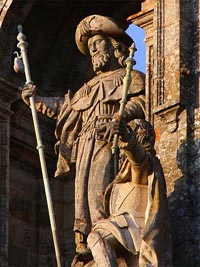 |
Spain | Travel | Regions | Cities | Coasts | Islands | Culture |
| Spain / Galicia / Santiago de Compostela / History and Legends |
|
| More Information | ||
| Plan your Trip | ||
| ||||||
 The name Santiago goes back to the Apostle James (Saint James = Santiago) who went to this most north-western part of Spain, called by the Romans "Finis Terrae", "end of the world", to preach and convert people to Christianity.
The name Santiago goes back to the Apostle James (Saint James = Santiago) who went to this most north-western part of Spain, called by the Romans "Finis Terrae", "end of the world", to preach and convert people to Christianity.After returning to Palestine in 44 a.C., he was taken prisoner by Herodes Agrippa and tortured to death. The king forbid to bury him, but in the night Jacob's disciples stole the body and brought him, in a sarcophagus of marble, on board of a small boat. The current of the sea drove the boat to the Spanish coast, into the port of the Roman province's capital, Iria Flavia. Here the Apostle was buried at a secret place in a wood. Centuries later, in 813, the hermit Pelayo listened music in that wood and saw a shining. For this shining the place was called, in Latin, "Campus Stellae", field of the star, name that was lateron turned into Compostela. Bishop Teodomiro, who received notice of that event, instituted an investigation, and so the tomb of the Apostle was discovered. King Alphonse II declared Saint James the patron of his empire and had built a chapel at that place. It is reported that from then on Saint James did several miracles, even that he fought side to side with King Ramiro I in the decisive battle against the Moors. More and more pilgrims followed the way of Santiago, the "Way of Saint James", and the original chapel soon became the cathedral of the new settlement, Santiago de Compostela..  In 12th and 13th century the town had its greatest importance, and Pope Alexander III declared it a Holy Town, like Rome and Jerusalem. Pope Calixto II declared that the pilgrims who went to Santiago in a Holy Year should be free of all their sins. El Año Santo (Holy Year) is celebrated each time when the Apostol's day (July, 25) is a Sunday. More Information: Galicia | Santiago de Compostela | Sightseeing | Fiestas and Folklore | Gastronomy | Nightlife | Photo Tour |